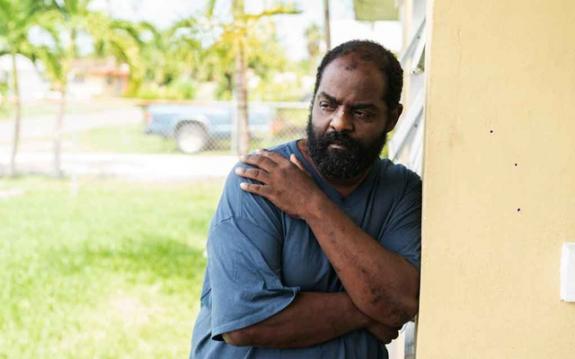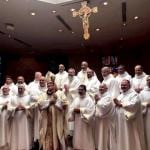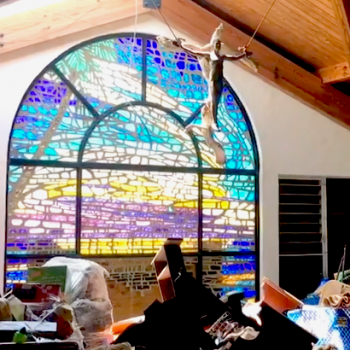Don’t put your faith in what you can see. Trust, instead, in what you can’t.

If we remember one name from the storm this week, it shouldn’t be Dorian.
The name we should remember is Brent Lowe.
Brent Lowe is a 49-year-old father in the Bahamas. Until a few days ago, he lived in a simple cement house on one of the islands. Then Hurricane Dorian hit. Mr. Lowe soon had company. As homes were demolished, desperate neighbors and relatives sought shelter with him.
As the hours ticked by, they sat in his living room and waited. Outside, it was getting worse. The wind hit 185-miles-an hour, as the rain pummeled the island. Mr. Lowe could hear the roof lift off the house, then slap back down. His neighbors knew they had to go. Finally, one by one, they stepped outside, braving the storm to find shelter somewhere else.
Mr. Lowe was one of the last to leave, and for good reason.
Brent Lowe is blind.
But that wasn’t all. He had someone else to worry about: his 24-year-old son. His son has cerebral palsy. He cannot walk. As the storm raged outside, his son lay hidden in the house, curled in the bathtub.
When the time came, the young man’s father did the only thing he could do. He lifted his son and put him on his shoulders and stepped outside and off his front porch. What he discovered shocked him. His street was flooded. The water came up to his chin.
But his neighbors were waiting for him. Grabbing onto them, Brent Lowe made his way through the water and the wind to the nearest house, five minutes away.
It was the most terrifying five minutes of his life.
Miraculously, he and his son survived. They eventually made it to Nassau, and safety, where Mr. Lowe was able to receive his regular dialysis treatment. His son is staying with relatives.
Hearing his story, I found myself moved by this man’s resilience and courage.
And I think it has something to say to us this morning — because the Gospel we just heard is also about resilience and courage.
Because that is what it takes to be a disciple of Jesus.
Part of the message of this scripture is clear: don’t be attached to the things of this world. Don’t even cling to your family. In fact, Jesus, using some hyperbole, says to “hate” them. And that’s not all. Detach yourself from possessions. Relationships. Things.
To walk the way of Christ, you need to be willing to let them go.
But the other message of this Gospel is not what Jesus says, but what he doesn’t.
It is implicit and powerful — and it should be familiar.
The message is: Don’t put your faith in what you can see.
Trust, instead, in what you can’t.
It echoes something he told his apostles when he first met them, which we also find in the Gospel of St. Luke: “Put out into the deep.” Go where the water is dark and the current is uncertain. Push away from the shore. Have courage. Trust. Do not be afraid.
Don’t hold on to what is visible. Reach for what is invisible.
Have the courage and the faith to go where you have never gone before.
Give up everything you thought you knew.
And put out into the deep.
Step off your porch and into the storm. Into the rising water. Go to a place you cannot see.
Make that leap of faith.
How do we do that? The psalmist makes this plea:
“Teach us to number our days aright,
that we may gain wisdom of heart.”
In other words: God, help us to know what is important. What matters. What lasts. Help us to see more clearly what leads us to salvation.
For guidance, just look at what St. Luke has been telling us over the last few weeks.
Last week, we heard a lesson on humility and sacrifice and selflessness.
But there has been more.
We heard Jesus tell us how to pray.
We heard about a woman named Mary, sitting at the feet of Jesus, listening — contrasted with Martha, who was so preoccupied with work she was “anxious about many things.”
We heard about a Samaritan who became a neighbor to a weak and wounded man by the side of the road.
We heard about the rich man who acquired much and built bigger and bigger barns — only to lose his life when he never expected it.
We heard about striving to enter through the narrow gate, to take the more difficult path.
All of this and more points not to what is tangible, but what is intangible.
We “gain wisdom of heart” through prayer. Through listening. Sacrifice. Faith. Mercy. Compassion.
We get there by doing what is difficult, by doing what often takes courage.
It means going where there are no guarantees.
It means putting out into the deep.
Like so many in the Bahamas, Brent Lowe and his son are facing an uncertain future. These people and many others need our prayers and our support. Mr. Lowe doesn’t know yet where they will live, or how.
But the fact that they are living at all is a wonder.
He risked much — but in the end, he also gained much. A life. A future. A new hope.
Isn’t that what our faith offers us all?
As we come forward for communion and reach out our hands to receive the Body of Christ, we reach out in humility — and in hope.
We hope and we pray that God will “teach us to number our days aright,” that we will learn to let go of the things holding us down or holding us back.
May we have the courage, like Brent Lowe, to carry what God gives us — and go forward into the unknown, trusting in what we cannot see.












